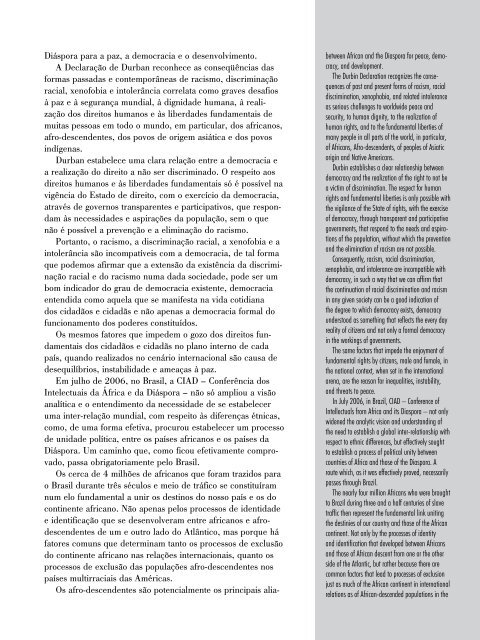Africa and Diaspora Post - CIAD II Edição/Edition - Ambiente ...
Africa and Diaspora Post - CIAD II Edição/Edition - Ambiente ...
Africa and Diaspora Post - CIAD II Edição/Edition - Ambiente ...
You also want an ePaper? Increase the reach of your titles
YUMPU automatically turns print PDFs into web optimized ePapers that Google loves.
Diáspora para a paz, a democracia e o desenvolvimento.<br />
A Declaração de Durban reconhece as conseqüências das<br />
formas passadas e contemporâneas de racismo, discriminação<br />
racial, xenofobia e intolerância correlata como graves desafios<br />
à paz e à segurança mundial, à dignidade humana, à realização<br />
dos direitos humanos e às liberdades fundamentais de<br />
muitas pessoas em todo o mundo, em particular, dos africanos,<br />
afro-descendentes, dos povos de origem asiática e dos povos<br />
indígenas.<br />
Durban estabelece uma clara relação entre a democracia e<br />
a realização do direito a não ser discriminado. O respeito aos<br />
direitos humanos e às liberdades fundamentais só é possível na<br />
vigência do Estado de direito, com o exercício da democracia,<br />
através de governos transparentes e participativos, que respondam<br />
às necessidades e aspirações da população, sem o que<br />
não é possível a prevenção e a eliminação do racismo.<br />
Portanto, o racismo, a discriminação racial, a xenofobia e a<br />
intolerância são incompatíveis com a democracia, de tal forma<br />
que podemos afirmar que a extensão da existência da discriminação<br />
racial e do racismo numa dada sociedade, pode ser um<br />
bom indicador do grau de democracia existente, democracia<br />
entendida como aquela que se manifesta na vida cotidiana<br />
dos cidadãos e cidadãs e não apenas a democracia formal do<br />
funcionamento dos poderes constituídos.<br />
Os mesmos fatores que impedem o gozo dos direitos fundamentais<br />
dos cidadãos e cidadãs no plano interno de cada<br />
país, qu<strong>and</strong>o realizados no cenário internacional são causa de<br />
desequilíbrios, instabilidade e ameaças à paz.<br />
Em julho de 2006, no Brasil, a <strong>CIAD</strong> – Conferência dos<br />
Intelectuais da África e da Diáspora – não só ampliou a visão<br />
analítica e o entendimento da necessidade de se estabelecer<br />
uma inter-relação mundial, com respeito às diferenças étnicas,<br />
como, de uma forma efetiva, procurou estabelecer um processo<br />
de unidade política, entre os países africanos e os países da<br />
Diáspora. Um caminho que, como ficou efetivamente comprovado,<br />
passa obrigatoriamente pelo Brasil.<br />
Os cerca de 4 milhões de africanos que foram trazidos para<br />
o Brasil durante três séculos e meio de tráfico se constituíram<br />
num elo fundamental a unir os destinos do nosso país e os do<br />
continente africano. Não apenas pelos processos de identidade<br />
e identificação que se desenvolveram entre africanos e afrodescendentes<br />
de um e outro lado do Atlântico, mas porque há<br />
fatores comuns que determinam tanto os processos de exclusão<br />
do continente africano nas relações internacionais, quanto os<br />
processos de exclusão das populações afro-descendentes nos<br />
países multirraciais das Américas.<br />
Os afro-descendentes são potencialmente os principais alia-<br />
between <strong>Africa</strong>n <strong>and</strong> the <strong>Diaspora</strong> for peace, democracy,<br />
<strong>and</strong> development.<br />
The Durbin Declaration recognizes the consequences<br />
of past <strong>and</strong> present forms of racism, racial<br />
discrimination, xenophobia, <strong>and</strong> related intolerance<br />
as serious challenges to worldwide peace <strong>and</strong><br />
security, to human dignity, to the realization of<br />
human rights, <strong>and</strong> to the fundamental liberties of<br />
many people in all parts of the world, in particular,<br />
of <strong>Africa</strong>ns, Afro-descendents, of peoples of Asiatic<br />
origin <strong>and</strong> Native Americans.<br />
Durbin establishes a clear relationship between<br />
democracy <strong>and</strong> the realization of the right to not be<br />
a victim of discrimination. The respect for human<br />
rights <strong>and</strong> fundamental liberties is only possible with<br />
the vigilance of the State of rights, with the exercise<br />
of democracy, through transparent <strong>and</strong> participative<br />
governments, that respond to the needs <strong>and</strong> aspirations<br />
of the population, without which the prevention<br />
<strong>and</strong> the elimination of racism are not possible.<br />
Consequently, racism, racial discrimination,<br />
xenophobia, <strong>and</strong> intolerance are incompatible with<br />
democracy, in such a way that we can affirm that<br />
the continuation of racial discrimination <strong>and</strong> racism<br />
in any given society can be a good indication of<br />
the degree to which democracy exists, democracy<br />
understood as something that reflects the every day<br />
reality of citizens <strong>and</strong> not only a formal democracy<br />
in the workings of governments.<br />
The same factors that impede the enjoyment of<br />
fundamental rights by citizens, male <strong>and</strong> female, in<br />
the national context, when set in the international<br />
arena, are the reason for inequalities, instability,<br />
<strong>and</strong> threats to peace.<br />
In July 2006, in Brazil, <strong>CIAD</strong> – Conference of<br />
Intellectuals from <strong>Africa</strong> <strong>and</strong> its <strong>Diaspora</strong> – not only<br />
widened the analytic vision <strong>and</strong> underst<strong>and</strong>ing of<br />
the need to establish a global inter-relationship with<br />
respect to ethnic differences, but effectively sought<br />
to establish a process of political unity between<br />
countries of <strong>Africa</strong> <strong>and</strong> those of the <strong>Diaspora</strong>. A<br />
route which, as it was effectively proved, necessarily<br />
passes through Brazil.<br />
The nearly four million <strong>Africa</strong>ns who were brought<br />
to Brazil during three <strong>and</strong> a half centuries of slave<br />
traffic then represent the fundamental link uniting<br />
the destinies of our country <strong>and</strong> those of the <strong>Africa</strong>n<br />
continent. Not only by the processes of identity<br />
<strong>and</strong> identification that developed between <strong>Africa</strong>ns<br />
<strong>and</strong> those of <strong>Africa</strong>n descent from one or the other<br />
side of the Atlantic, but rather because there are<br />
common factors that lead to processes of exclusion<br />
just as much of the <strong>Africa</strong>n continent in international<br />
relations as of <strong>Africa</strong>n-descended populations in the


